

Who’s reading my iMessages? — Adventures in Consumer Technology. Intel’s voice recognition will blow Siri out of the water—because it doesn’t use the cloud. There’s a problem with today’s voice recognition systems: They’re just too slow.
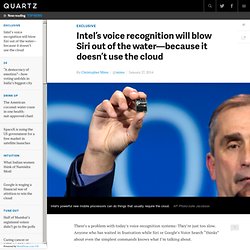
Anyone who has waited in frustration while Siri or Google’s Voice Search “thinks” about even the simplest commands knows what I’m talking about. The problem isn’t voice recognition software per se, which is more accurate than ever. The problem is that voice recognition is still a challenging enough problem, computationally, that all the major consumer platforms that do it—whether built by Google, Apple or Microsoft with the new Xbox—must send a compressed recording of your voice to servers hundreds or thousands of miles away. There, computers more powerful than your phone or game console transform it into text or a command.
Why Android First is a Myth. In mobile, particularly in consumer markets, there has been an ongoing debate about when or if Android will become the first platform that sophisticated startups develop for.
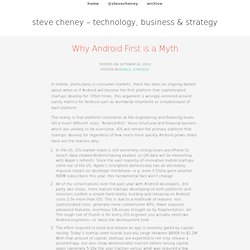
Often times, this argument is wrongly centered around vanity metrics for Android such as worldwide shipments or installed base of each platform. The reality is that platform constraints at the engineering and financing levels tell a much different story. “Android-first” faces structural and financial barriers which are unlikely to be overcome. iOS will remain the primary platform that startups develop for regardless of how much more quickly Android grows share.
Here are the reasons why: In the US, iOS market share is still extremely strong (even pre-iPhone 5s launch data showed Android having peaked, so Q4 data will be interesting with Apple’s refresh). While in theory Android provides a very modern platform for mobile development, the realities around Android-first are quite different. The Brilliant Hack That Brought Foursquare Back From the Dead. Dennis Crowley.

Where’s Twitter Music For Android? Why Today’s Tech Companies Are Still Going iOS First. Where is Twitter Music for Android?
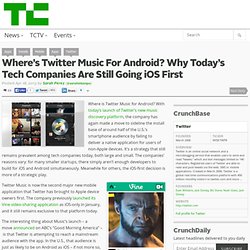
With today’s launch of Twitter’s new music discovery platform, the company has again made a move to sideline the install base of around half of the U.S.’s smartphone audience by failing to deliver a native application for users of non-Apple devices. It’s a strategy that still remains prevalent among tech companies today, both large and small. The companies’ reasons vary: for many smaller startups, there simply aren’t enough developers to build for iOS and Android simultaneously. Meanwhile for others, the iOS-first decision is more of a strategic play. Twitter Music is now the second major new mobile application that Twitter has brought to Apple device owners first. The interesting thing about Music’s launch – a move announced on ABC’s “Good Morning America” – is that Twitter is attempting to reach a mainstream audience with the app.
The Android platform is also now surging past iOS in terms of smartphone sales. Android apps worth a try. Beyond the install: 10 keys to driving sustainable mobile user growth. By James Slavet and Sanjay Raman On December 17, 2012 The path to building a breakout mobile product comes with an entirely new set of rules.
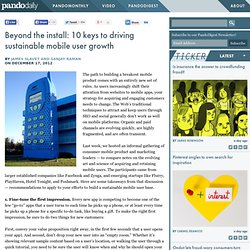
As users increasingly shift their attention from websites to mobile apps, your strategy for acquiring and engaging customers needs to change. The Web’s traditional techniques to attract and keep users through SEO and social generally don’t work as well on mobile platforms. Organic and paid channels are evolving quickly, are highly fragmented, and are often transient. Last week, we hosted an informal gathering of consumer mobile product and marketing leaders — to compare notes on the evolving art and science of acquiring and retaining mobile users.
Why We’re Pivoting from Mobile-first to Web-first. There has been discussion from the venture capitalist angle on the failings of mobile consumer companies, including posts by Fred Wilson and Om Malik.
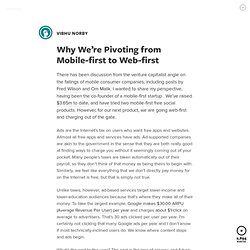
I wanted to share my perspective, having been the co-founder of a mobile-first startup . We’ve raised $3.65m to date, and have tried two mobile-first free social products. However, for our next product, we are going web-first and charging out of the gate. Ads are the Internet’s tax on users who want free apps and websites. Iterations: The Harsh Realities Of iOS App Distribution. Editor’s Note: Semil Shah is an EIR with Javelin Venture Partners and has been an official contributor to TechCrunch since January 2011.

You can follow him on Twitter at @semil. In this post, I’m going to try illuminate a tactical problem many application developers face, but unfortunately, I must claim upfront that I don’t know if any solution exists without a fundamental change occurring. The topic for this week’s column is to peel back the layers on mobile app distribution in Apple’s iOS, and in doing so, hopefully illuminate areas developers can exploit given the treacherous conditions that currently exist.
Windows Phone 8 Is A Great Big, Crazy, Beautiful Mess. The Lumia 900 sold me on Windows Phone.
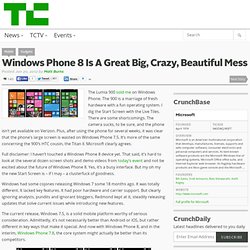
The 900 is a marriage of fresh hardware with a fun operating system. I dig the Start Screen with the Live Tiles. There are some shortcomings. The camera sucks, to be sure, and the phone isn’t yet available on Verizon. Plus, after using the phone for several weeks, it was clear that the phone’s large screen is wasted on Windows Phone 7.5. Full disclaimer: I haven’t touched a Windows Phone 8 device yet. Windows had some cojones releasing Windows 7 some 18 months ago. The current release, Windows 7.5, is a solid mobile platform worthy of serious consideration. The new Start Screen will debut on some current devices with Windows Phone 7.8.
Samsung Ends Nokia’s 14-Year Run as Biggest Handset Maker. Samsung Electronics Co. (005930) overtook Nokia Oyj (NOK1V) as the world’s biggest vendor of mobile phones for the first time, ending the Finnish company’s 14-year run as the global leader, according to an industry study.
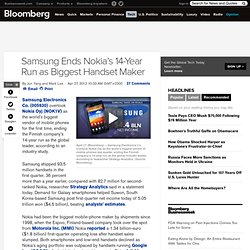
Samsung shipped 93.5 million handsets in the first quarter, 36 percent more than a year earlier, compared with 82.7 million for second-ranked Nokia, researcher Strategy Analytics said in a statement today. Demand for Galaxy smartphones helped Suwon, South Korea-based Samsung post first-quarter net income today of 5.05 trillion won ($4.5 billion), beating analysts’ estimates. Nokia had been the biggest mobile-phone maker by shipments since 1998, when the Espoo, Finland-based company took over the spot from Motorola Inc. (MMI) Nokia reported a 1.34 billion-euro ($1.8 billion) first-quarter operating loss after handset sales slumped.
Both smartphones and low-end handsets declined as Nokia’s aging portfolio was outpaced by handsets running Google Inc. Nokia Stock Drops Close. Is Mobile Affecting When We Read? « Read It Later Blog. Printed media used to allow us to read in the places we found most comfortable.
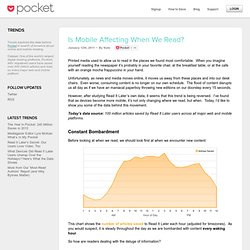
When you imagine yourself reading the newspaper it’s probably in your favorite chair, at the breakfast table, or at the cafe with an orange mocha frappuccino in your hand. Unfortunately, as news and media moves online, it moves us away from these places and into our desk chairs. Building Smarter Apps. A new breed of mobile applications is coming. These new apps will not only “sense” the world around you, using the smartphone’s sensors like the compass, GPS, and accelerometer – they’ll also be able to combine that data with a history of your actions to intelligently determine your likes, interests and favorites.
This understanding of the world, or “ambient discovery” if you will, could then be piped into any app to make it smarter, whether it’s a social app for finding friends, a Siri-like personal assistant, a fitness app, a mobile game, or anything else. This, at least, is the promise from the Palo Alto-based startup, Alohar Mobile, which recently introduced new SDKs for mobile app developers interested in experimenting with the possibilities of smarter apps. Alohar Mobile (newly emerged from stealth mode), was founded by a former Platform Architect of Google’s Location Server Platform, Sam Liang.
QR Code and 2D Code Generator. Mobile Notifications. I was talking to a bunch of entrepreneurs a few weeks ago, and someone asked me what I thought was new and game changing. I replied mobile notifications. I thought I'd explain why. I'm talking about android notifications here, not iPhone notifications or anything else. The Media Comes To The Defense Of WikiLeaks At LeWeb: “The Leakers Will Win” Visa to Use Your Phone's Location to Prevent Credit Card Fraud. Sure, you like all the great benefits of having your phone know where you are. Google's Android racing against Apple's iOS to deliver tap-to-buy features. By Daniel Eran Dilger The latest battle to emerge in the war between Google's Android and Apple's iOS is the race to add support for Near Field Communications, a chip that enables users to tap their phone to initiate secure transactions.
Google chief executive Eric Schmidt demonstrated a prototype Android phone at the Web 2.0 Summit today, focusing on features of the next major release of the Android OS, codenamed Gingerbread. Coalition Of The Willing. Why The Mobile Advertising Wars Have Just Begun. Exclusive: First Look at Siine, a Revolution in Text-Based Communication.